- Home
- I am a …
- Resources
- Collections
- Post-lockdown teaching support
- Remote teaching support
- Starters for ten
- Screen experiments
- Assessment for learning
- Microscale chemistry
- Faces of chemistry
- Classic chemistry experiments
- Nuffield practical collection
- Anecdotes for chemistry teachers
- More …
- Literacy in science teaching
- Climate change and sustainability
- Alchemy
- On this day in chemistry
- Global experiments
- PhET interactive simulations
- Chemistry vignettes
- Context and problem based learning
- Journal of the month
- Chemistry and art
- Classic chemistry demonstrations
- In search of solutions
- In search of more solutions
- Creative problem-solving in chemistry
- Solar spark
- Chemistry for non-specialists
- Health and safety in higher education
- Analytical chemistry introductions
- Exhibition chemistry
- Introductory maths for higher education
- Commercial skills for chemists
- Kitchen chemistry
- Journals how to guides
- Chemistry in health
- Chemistry in sport
- Chemistry in your cupboard
- Chocolate chemistry
- Adnoddau addysgu cemeg Cymraeg
- The chemistry of fireworks
- Festive chemistry
- Collections
- Education in Chemistry
- Teach Chemistry
- Events
- Teacher PD
- Enrichment
- Our work
- More from navigation items
Close menu
- Home
- I am a …
-
Resources
- Back to parent navigation item
- Resources
- Primary
- Secondary
- Higher education
- Curriculum support
- Practical
- Analysis
- Literacy in science teaching
- Periodic table
- Climate change and sustainability
- Careers
- Resources shop
-
Collections
- Back to parent navigation item
- Collections
- Post-lockdown teaching support
- Remote teaching support
- Starters for ten
- Screen experiments
- Assessment for learning
- Microscale chemistry
- Faces of chemistry
- Classic chemistry experiments
- Nuffield practical collection
- Anecdotes for chemistry teachers
- More …
- Literacy in science teaching
- Climate change and sustainability
- Alchemy
- On this day in chemistry
- Global experiments
- PhET interactive simulations
- Chemistry vignettes
- Context and problem based learning
- Journal of the month
-
Chemistry and art
- Back to parent navigation item
- Chemistry and art
- Techniques
- Art analysis
- Pigments and colours
- Ancient art: today's technology
- Psychology and art theory
- Art and archaeology
- Artists as chemists
- The physics of restoration and conservation
- Cave art
- Ancient Egyptian art
- Ancient Greek art
- Ancient Roman art
- Classic chemistry demonstrations
- In search of solutions
- In search of more solutions
- Creative problem-solving in chemistry
- Solar spark
- Chemistry for non-specialists
- Health and safety in higher education
- Analytical chemistry introductions
- Exhibition chemistry
- Introductory maths for higher education
- Commercial skills for chemists
- Kitchen chemistry
- Journals how to guides
- Chemistry in health
- Chemistry in sport
- Chemistry in your cupboard
- Chocolate chemistry
- Adnoddau addysgu cemeg Cymraeg
- The chemistry of fireworks
- Festive chemistry
- Education in Chemistry
- Teach Chemistry
- Events
- Teacher PD
- Enrichment
- Our work
The ‘breathalyser’ reaction | 16–18 years
In association with Nuffield Foundation, By  Tim Jolliff and
Tim Jolliff and  Sandrine Bouchelkia
Sandrine Bouchelkia

Source: Composite: © Monty Rakusen/Getty Images/Royal Society of Chemistry
Try this demonstration to recreate an early ‘breathalyser’ test, passing ethanol vapour through potassium dichromate. Includes kit list and safety instructions
In this experiment, show post-16 learners the reaction used in early forms of ‘breathalyser’. As air containing ethanol vapour passes through the acidified potassium dichromate solution, learners can observe a visible change from the orange of dichromate(VI), through brown, to the green of chromium(III) ions. Use the demonstration and student worksheet to provide context when teaching the properties of alcohols. The ‘breathalyser’ reaction is also a good opportunity to discuss the dangers of drinking and driving, although modern ‘breathalysers’ use electronic methods to detect and measure alcohol concentration. Learners will require prior knowledge of redox, oxidation states and properties of transition elements, in addition to the oxidation of alcohols.
Thanks for using the RSC’s education resources. You can view one resource per month as a visitor, or two resources per month when you’re logged in with a personal account.

Register for Teach Chemistry for free, unlimited access
Registration is open to all teachers and technicians at secondary schools, colleges and teacher training institutions in the UK and Ireland.
Get all this, plus much more:
- unlimited access to resources, core practical videos and Education in Chemistry articles
- teacher well-being toolkit, personal development resources and online assessments
- applications for funding to support your lessons
Already a Teach Chemistry member? Sign in now.
Not a science teacher or technician based in the UK or Ireland? Don’t worry – you can also access all our resources with Royal Society of Chemistry membership.











